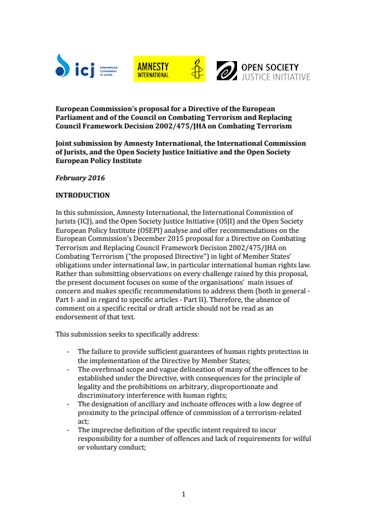This document was submitted by the Open Society Foundations, Amnesty International, and the International Commission of Jurists. It provides comments on the European Commission’s December 2015 draft proposal for a Directive of the European Parliament and of the Council on Combating Terrorism and Replacing Council Framework Decision 2002/475/JHA on Combating Terrorism.
The proposed Directive develops and extends the criminalisation of terrorism-related acts in EU law, building on Framework Decision 2002/475/JHA on Combating Terrorism as amended by Framework Decision 2008/919/JHA. The impetus for the new offences included in the proposed Directive is said to be UN Security Council Resolution 2178 (2014), which seeks to address what is often characterized as the “foreign terrorist fighters” phenomenon and provides that:
“Member States shall … prevent and suppress the recruiting, organizing, transporting or equipping of individuals who travel to a State other than their States of residence or nationality for the purpose of the perpetration, planning, or preparation of, or participation in, terrorist acts or the providing or receiving of terrorist training, and the financing of their travel and of their activities”.
The proposed Directive further draws on the Additional Protocol to the Council of Europe’s Convention on the Prevention of Terrorism adopted in May 2015 (“the Additional Protocol”), which was aimed at implementing Security Council Resolution 2178 within the Council of Europe legal framework. The Justice Initiative made a series of submissions on that draft Protocol.
The Justice Initiative's joint submission to the draft Directive expresses concerns over a number of weak human rights protections in the proposed text.
- The failure to provide sufficient guarantees of human rights protection in the implementation of the Directive by Member States;
- The excessive scope and vague delineation of many of the offences to be established under the Directive, with consequences for the principle of legality and the prohibitions on arbitrary, disproportionate and discriminatory interference with human rights;
- The designation of ancillary and inchoate offences with a low degree of proximity to the principal offence of commission of a terrorism-related act;
- The imprecise definition of the specific intent required to incur responsibility for a number of offences and lack of requirements for wilful or voluntary conduct;
- The potential of the Directive to undermine states’ obligations under international humanitarian law and international criminal law, where those regimes are applicable.
